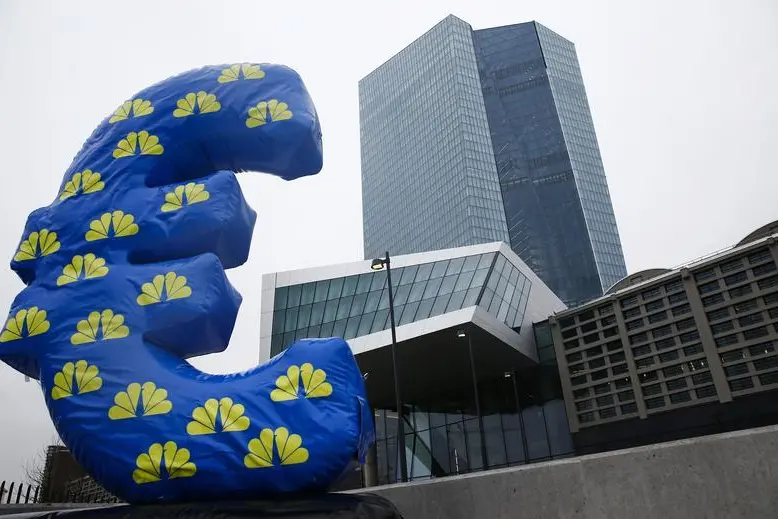PHOTO
LONDON - Europe’s bank investors have responded badly to the prospect of free money. The EURO STOXX Banks index dropped 17% on Thursday, even as European Central Bank boss Christine Lagarde gave lenders super-cheap funding and capital relief to fight a coronavirus-induced slump. For euro zone banks and their peers in the United Kingdom, being on the front lines of the fightback is a mixed blessing.
The rescue packages may seem like a win for Deutsche Bank , Lloyds Banking Group, BNP Paribas and the like. The ECB will allow lenders to eat through two layers of their balance-sheet capital safety nets. Bank of England Governor Mark Carney similarly slashed a counter-cyclical buffer, which he reckons could unlock 190 billion pounds of credit.
Central banks are also opening the liquidity taps to ensure banks can meet customers’ needs, such as paying bills during a cash flow crunch. Euro zone lenders will be able to tap ECB funding equivalent to up to half their total loans to businesses and households, excluding mortgages, at rates as low as minus 0.75%. Deutsche Bank analysts reckon that equates to 1.2 trillion euros of additional super-cheap liquidity.
The benefits are limited, though. The ECB’s capital relief is temporary, so lenders will have to rebuild buffers once the pandemic subsides. Meanwhile, regulators have rightly specified that the extra headroom should not be used to reward investors through increased dividends and share buybacks, or by paying bigger bonuses to employees.
The cheapest ECB borrowing rates, meanwhile, are contingent on banks keeping net lending at least stable even as the economy deteriorates. The BoE’s equivalent programme extends extra funding to banks that boost lending to small businesses, typically the riskiest credits. That’s a sensible way to try to minimise economic damage. But if borrowers get into trouble later those loans will eat into bank capital. Today’s emergency credit may become tomorrow’s bad debt.
Finally, cut-throat competition and companies’ dire need for cash means banks will face pressure to pass on cheap funding in the form of lower interest rates on loans. The resulting picture is an inversion of the 2008 crisis. Bank balance sheets that once threatened to crash the economy are now being deployed to absorb a virus-induced shock. Little wonder investors are pressing the escape button.
CONTEXT NEWS
- The European Central Bank on March 12 left its deposit rate unchanged at minus 0.5% but announced new stimulus measures to help the euro zone economy cope with the growing cost of the coronavirus.
- The ECB said it would offer new loans to banks and temporarily increase asset purchases. It also said banks would be able to tap existing longer-term lending facilities at more favourable terms than in the past.
- The ECB also said it would let euro zone banks that it directly supervises fall short of some key capital and cash requirements so that lenders could continue to provide funding to the economy while it was being disrupted by the coronavirus.
- "The ECB will allow banks to operate temporarily below the level of capital defined by the Pillar 2 Guidance (P2G), the capital conservation buffer (CCB) and the liquidity coverage ratio (LCR)," the ECB said in a statement.
- The EURO STOXX Banks index fell 17% on March 12. It was up 3.3% by 0930 GMT on March 13.
(Editing by Peter Thal Larsen and Oliver Taslic)
© Reuters News 2020





















